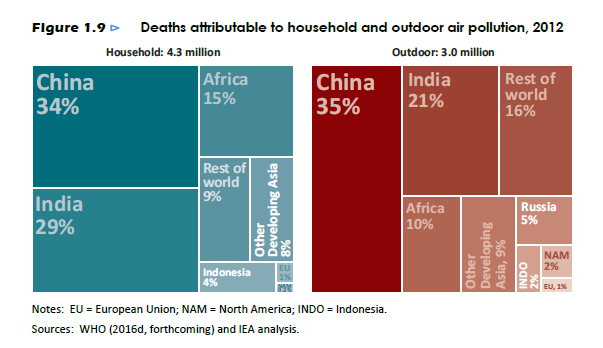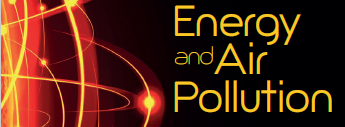IEA Urges Cut in Air Pollution Deaths by 2040
A 7% increase in energy investment could cut premature deaths from air pollution in half by 2040, says the International Energy Agency (IEA) in a special report published June 27. Its strategy is based on existing energy technologies and policies that can cut 50% of pollutant emissions, the fourth-largest threat to human health, by 2040.
Annually some 6.5mn deaths are linked to air pollution, according to previously published World Health Organisation 2012 data, with energy pollution the main cause. The IEA now says that number will rise sharply in coming decades, unless the energy sector takes greater action to curb emissions.
Premature deaths from outdoor air pollution are projected to rise from 3mn today to 4.5mn by 2040, concentrated mainly in developing Asia, under the IEA's baseline scenario, while premature deaths from household air pollution will decline from 3.5mn to 3mn over the same period although these continue to be heavily linked to poverty and an inability to access modern energy.
In its first ever in-depth analysis of air quality, the IEA’s World Energy Outlook (WEO) special report advocates a ‘Clean Air Scenario' that will result in just a 7% increase in total energy investment through 2040, but produce a sharp improvement in health. Under such a scenario, premature deaths from outdoor air pollution would decline by 1.7mn in 2040 compared with its main scenario, and those from household pollution would fall by 1.6mn annually.
The IEA strategy for cleaner air requires the implementation of a number of proven policies. Actions to deliver access to clean cooking facilities to an additional 1.8bn people by 2040 are essential to reducing household emissions in developing countries, while emissions controls and fuel switching are crucial in the power sector, as is increasing energy efficiency in industry and emissions standards that are strictly enforced for road transport.
The report says that gas can play a role in reducing pollution from power generation, industry and transport uses.
Burning oil or coal to generate electricity produces significant quantities of nitrogen oxides (NOx) and in some cases particulates, whereas natural gas-fired plants emit fewer air pollutants than coal and oil-fired power plants, the report notes.
In 2015, gas-fired generation emitted close to 20% of NOx from power generation but barely any sulfur oxides or particulates, the report added, as natural gas with sulphur typically has its sulphur removed before the gas is marketed, explaining the low-sulfur emissions from gas-fired plants.

Deaths attributable to all household and outdoor air pollution, 2012 (Graphic credit: IEA)
Energy-related methane emissions worldwide were estimated at 100mn metric tons in 2013, the IEA estimates, of which 55mn tons (80bn m³) from the oil and gas sector, mainly upstream. “Capturing the methane currently emitted to the atmosphere would also be a significant additional source of gas supply,” the report says, noting that 80bn m³ is equivalent to Algeria’s current annual marketed gas production.
Part of the cover page of the IEA's latest Special Report (Graphic credit: IEA)
Mark Smedley | www.naturalgaseurope.com



